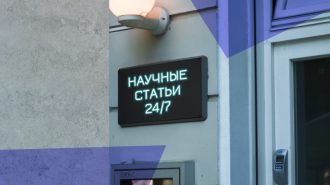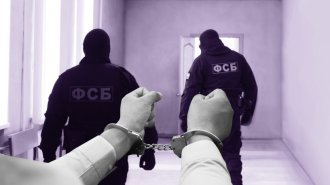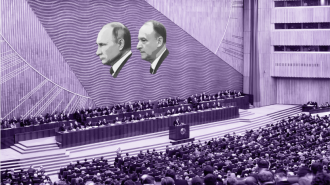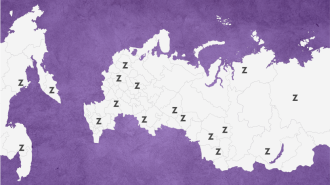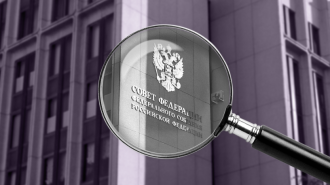T-invariant has repeatedly described how the Ministry of Education and Science and the leadership of the Russian Academy of Sciences are destroying the Institute for Information Transmission Problems (IPPI RAS). The demonstrative cancellation of the contract with the head of the institute, Andrei Sobolevsky, ignoring the opinion of scientists, led to a conflict between the scientific staff and the new directorate, the departure of a number of employees to MIPT, and the appointment of Dmitry Repin, a scientist with a dubious reputation, as deputy director. The Academic Council of IPPI has recently been headed by Dissertnet members.
Russian Academy of Science
The redistribution of the market for the publication and distribution of academic scientific journals has led not only to serious delays in the publication of scientists' works, but also to Russia's self-isolation in the global market of scientific periodicals. By the beginning of December 2024, almost 75% of Russian academic scientific journals have not gone to press on time. This is the price of striving to publish scientific journals with a "Russian identity" and without foreign influence. T-invariant tells us what has already happened to Russian scientific periodicals and what else may happen to them.
St. Petersburg State University was the first Russian university to ban its employees from publishing in international open access journals published by Elsevier. There are good reasons for this: as Elsevier told T-invarinat, the funds received from Russian authors are indeed sent to Ukraine.
"The Troitsk excavation under threat", "The last chance to learn our history", "Archaeologists ask for help " - only a small part of the publications that appeared this autumn. Fears of losing ancient Novgorod literatures are connected with the construction of the historical and archaeological centre, which is due to start this year.
Recently, American scientist Sam Payne received a review of his own article published three years earlier, but now its authors were five employees of Sechenov University. So the world scientific community learnt about the Russian company "International Publisher", which is engaged in the production of fake scientific articles and places them for money in major foreign journals. More details - in the material T-invariant.
In early September, it became known that Dmitry Repin, who previously held the position of Advisor to the Rector of the Russian Academy of National Economy and Public Administration, was appointed Acting Deputy Director of IPPI RAS. The appointment took place against the background of the ongoing public conflict between the scientific staff of the institute and the recently appointed acting director of IPPI Maxim Fedorov. T-invariant tells what is known about the new administrator of the institute.
Students of the "School of District Anti-Corruption" together with Groza and T-Invariant studied the composition of expert councils at the Ministry of Education and Science of the Russian Federation. It turned out that more than 10 per cent of the experts who influence decision-making "on the most important issues of the ministry's activities" are plagiarists and violators of academic ethics.
In the Kara Sea, for the second week now, a drama has been developing around the research vessel “Akademik Nikolay Strakhov”, which is stuck there. T-invariant describes the broad context of the problem and tells what role Mikhail Kovalchuk can play in the emergency, who tried in the summer to bring the Institute of Oceanology of the Russian Academy of Sciences into the structure of his Kurchatov Center.
33-year-old physicist Artem Khoroshilov is accused of treason. The FSB declared him a hacker who, on orders from the Ukrainian Armed Forces, organized "attacks on critical information infrastructure facilities." The employee of the Prokhorov General Physics Institute of the Russian Academy of Sciences could face life imprisonment.
RSUH, RUDN, Financial University under the Government of the Russian Federation, MGPPU were among the universities that founded and published journals with violations. "Laboratory of University Transparency" (Lupa) and T-invariant checked government procurement of 100 higher education institutions and found out that some of them conclude contracts with dubious publications.
Tomsk State University graduated the first masters of the pilot program "Legal Linguistics". As graduation theses, students defended a portfolio of linguistic research and expert assessments on real criminal and administrative cases.
The FSB has been persecuting members of the Russian Academy of Sciences Sergey Abramov and Oleg Kabov for several years now. Their criminal cases are so unprecedented that the American Physical Society, one of the largest in the scientific world, is worried about their fate. Its representatives are sending letters to the President of the Russian Academy of Sciences and the Minister of Science and Higher Education of the Russian Federation.
At the end of June, acting Rector of the Russian State University for the Humanities named Andrey Loginov, ex-Deputy Minister of Justice of Russia. This happened against the backdrop of a public scandal around the “Higher Political School” named after Ivan Ilyin, headed by Alexander Dugin, created at the university. T-invariant analyzed Loginov’s biography and found that he has no less importance than Ilyin and Dugin, grounds to claim the title of the main ideologist of the “Russian world”.
The Joint Institute for Nuclear Research in Dubna and the European Organization for Nuclear Research may sever official relations as early as this week.
Academicians turned to Vladimir Putin with a proposal to head a new body of the Russian Academy of Sciences - the Board of Trustees. But not everyone was able to vote for this decision. FSO employees blacklisted more than twenty scientists and did not allow them to attend the General Meeting of the Russian Academy of Sciences.
In Novosibirsk, they are considering the criminal case of corresponding member of the Russian Academy of Sciences Oleg Kabov, which was initiated by the FSB. This is the first case in Russia when a scientist is being tried for his allegedly unsatisfactory work, and scientific and technical expertise forms the basic part of the charge. The very fact that you can go to prison for poorly conducted research is a new page both in the history of Russian science and in the history of domestic jurisprudence. Kabov's case is a challenge to the entire scientific community. It will show whether science in Russia can defend its right to exist.
Vladimir Putin updated and expanded scientific council at the Security Council of the Russian Federation. T-invariant analyzed the biographies of all its 174 members. The median age of the council is pre-retirement, 63.5 years. The oldest member is 94 years old.
February 24, 2022 is a date that divided the lives of millions of people into before and after. Millions of Ukrainians became refugees, hundreds of thousands of Russians were forced to leave the country, thousands of people became political prisoners. Schools and universities have been invaded by Z-ideology. This gave rise to a new Russian reality, which more than 75 sociologists, historians, demographers and economists studying Russian society tried to comprehend.
University Transparency Laboratory (Lupa), with the help of the free online community Dissernet, analyzed the activities of expert councils of the upper house of the Russian parliament. It turned out that 10% of experts advising senators on the laws they pass have violations of academic ethics.






